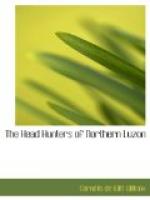We found the town unusually clean. Public latrines exist, and public drinking-tanks, both put in by Governor Hale, and highly approved of the people. The houses themselves were the best we had seen, some of them hexagonal in ground plan, and built of hard woods. The pigs stay underneath, to be sure, but their place is kept clean. Rich men have rows of plates, the dinner-plates of civilization, all around their houses, and take-up floors of split bamboo are common, being rolled up and washed in the neighboring stream with commendable frequency. All together, Lubuagan made the impression of an affluent, not to say opulent, center, inhabitated by a brave, proud, and self-respecting people.
CHAPTER XXIII
We leave the mountains.—Nanong.—Passage of the Chico.—The Apayao.—Tabuk.—The party breaks up.—Desolate plain.—The Cagayan Valley.—Enrile.
The morning of Friday, May 13th, broke clear after a night of hard rain. We set off before sunrise, our way now taking us eastward for the last stage of the mountain journey proper. The whole earth this morning seemed to be a-drip: every stream was rushing, and banks of cloud, fog, and mist crowned the heights and filled the valleys. To describe even approximately our course as we descended from the great terrace of Lubuagan is well-nigh impossible; but, as we came down, scene after scene of the greatest beauty offered itself to our admiration. The landscape softened too; we were leaving the high mountain land behind us, not too suddenly, however; for example, at one point a huge valley lay below us, bounded on the other side by a tremendous vertical wall of rock, over which fell a powerful stream. I estimated the fall at the time as at least four hundred feet.
In due course we came to an affluent of our old friend the Chico, and had to ford. The stream was up, but we got over without mishap. Fording is always a delicate operation in these, mountains after a hard rain, since no one can ever tell what the nature of the footing will be, because of the boulders swept down. On this occasion Evans’s pony stopped short in mid-stream, refusing either to move on or back. There was nothing for it but dismount and investigate, Evans discovering that his pony had put one foot down between two large stones close together and so was simply caught fast. The country had now become decidedly more open; the trail for long stretches was almost a road. As a matter of fact, we were on the old main line of communication from the highlands to the Cagayan Valley. We made our first halt at Nanong, where everybody brought in gifts of chickens, eggs, and camotes and received beads, red cloth, pins and needles in return. What made a particular impression here was the number of children brought in, all wide-eyed, sloe-eyed, and some of them extremely pretty. The remainder of the day we spent going down the left bank of the




